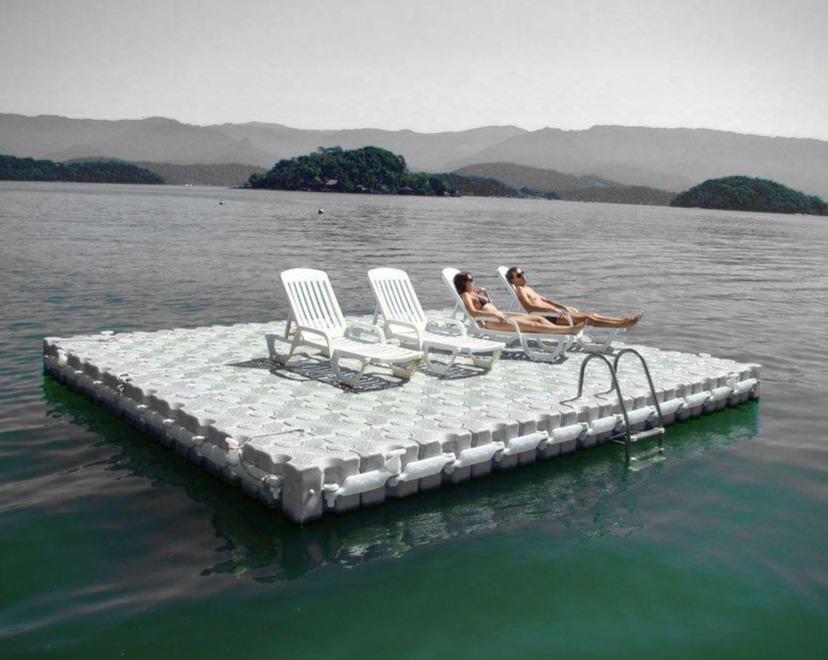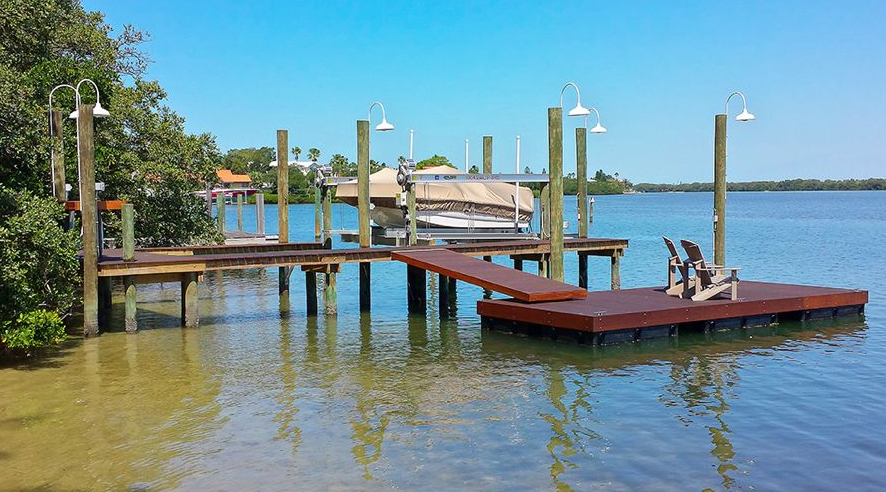Floating Docks: The Ideal Option for Versatile Water Accessibility
Floating docks existing an engaging option for a range of water gain access to needs, supplying convenience that goes beyond conventional mooring choices. The modular nature of floating docks helps with customization, providing to certain requirements.
Benefits of Floating Docks
Floating docks deal various advantages that improve water gain access to for various applications. Their capacity to drop and rise with transforming water degrees makes them especially advantageous in settings with varying trends or seasonal variants. This flexibility guarantees that vessels can conveniently anchor without issue for the water's deepness, offering a reputable system for recreational, business, and industrial usages.
Furthermore, floating docks are frequently created from resilient products that stand up to deterioration, making them suitable for long-lasting usage in aquatic environments. Their setup is commonly less invasive than typical set docks, decreasing the ecological influence and assisting in quicker deployment (dock company). This flexibility enables much easier moving or reconfiguration according to user requirements or environmental modifications
Security is an additional essential benefit; floating docks can supply steady accessibility for people getting off or boarding from watercrafts and minimize the danger of mishaps related to unsteady surface areas. They can be made to fit a range of accessories, such as cleats and fenders, boosting capability. On the whole, floating docks stand for an effective service for improving water access across diverse industries while promoting security and ecological sustainability.

Kinds Of Floating Docks
Different sorts of floating docks accommodate different requirements and settings, each developed with details features to enhance functionality. The most typical types include modular docks, which contain interlacing sections that enable very easy customization and development. These docks are optimal for recreational use, as they can be tailored to fit different boat dimensions and water conditions.
An additional prominent option is the fixed floating dock, which stays anchored in position yet floats with transforming water degrees. floating docks. This type is especially matched for areas with minimal tidal changes, giving stable access for fishing or swimming. Furthermore, there are drive-on docks, which feature a sloped design that enables boats to quickly drive on and off, making them ideal for individual boat and smaller vessels
For industrial applications, durable floating docks are offered, built from strengthened products to hold up against considerable tons and extreme aquatic atmospheres. Eco-friendly floating docks make use of lasting products and styles to reduce environmental impact, often including features like plants to support neighborhood wild animals. Comprehending the different kinds of floating docks makes certain that individuals can select the most ideal option for their particular needs.
Installment Process Overview
An effective setup of floating docks calls for cautious preparation and interest to detail to make certain ideal efficiency and security. The initial action includes examining the site problems, including water deepness, current, and possible challenges. This assessment educates the selection of the ideal dock materials and layout tailored to the details setting.
Next, getting required authorizations is important, as many territories have regulations pertaining to building and construction on water bodies. When consents are safeguarded, the installment can proceed. Begin by preparing the structure, which might involve anchoring systems or pilings customized to the dock kind and local conditions.
Following the foundation setup, put together the dock areas according click for more to supplier requirements. Make certain that all components are firmly secured and aligned to stand up to ecological tensions. Setting the dock in the marked location, ensuring it is degree and steady.

Maintenance Tips and Best Practices
After the installment procedure is full, continuous maintenance plays an important role in ensuring the long life and capability of floating docks. Regular inspections should be performed to recognize any type of signs of wear, degeneration, or damage - floating docks. Examine for any type of loose installations, cracks, or splitting up in the dock sections, as these can compromise structural honesty
Cleaning up the dock is important to get rid of particles, algae, and other accumulation that can affect its look and security. Make use of a gentle stress laundry periodically to preserve cleanliness without causing damages to the surface. In addition, applying a safety sealant every few years can help improve durability and resist environmental wear.
Take notice of the mooring lines and anchors, guaranteeing they are protected and cost-free from corrosion. Change any type of abject elements without delay to avoid dangers. Seasonal adjustments might additionally be necessary; throughout severe climate conditions, rearranging or enhancing the dock can avoid damages.
Applications for Floating Docks
Floating docks serve a wide variety of applications, accommodating both recreational and industrial needs. In leisure settings, they supply smooth accessibility to waterways for activities such as boating, fishing, and swimming. Their flexible nature enables setup in differing water levels, making sure stable and safe gain access to despite tidal variations.
Readily, floating docks are vital for marinas and beachfront businesses. They promote the docking of vessels, enabling efficient unloading and loading of goods. Their modular design enables very easy development or reconfiguration to suit transforming organization needs, making them excellent for watercraft services, tour operations, or fishing charters.
Additionally, floating docks are made use of why not try these out in ecological applications such as water research study and habitat reconstruction. They can function as systems for clinical research studies, keeping an eye on water high quality, or carrying out wildlife studies without troubling delicate ecosystems.
In commercial contexts, floating docks are employed site link in building projects, providing accessibility to hard-to-reach areas for equipment and employees. Their adaptability, longevity, and very little effect on the environment make them an optimal selection for a large range of applications, enhancing both capability and availability in different water-based environments.
Conclusion
To conclude, floating docks represent an optimum service for diverse water accessibility needs, owing to their adaptability, resilience, and modular layout. These structures facilitate risk-free mooring for various applications while lessening environmental influence throughout installation. The lowered maintenance needs even more boost their functionality. Floating docks serve as a useful property for recreational, industrial, and ecological projects, guaranteeing trusted access to waterways and advertising sustainable techniques in aquatic atmospheres.
Floating docks present a compelling service for a range of water gain access to requires, supplying versatility that transcends traditional mooring options.Floating docks deal countless benefits that boost water access for various applications. Overall, floating docks stand for an efficient option for enhancing water gain access to across diverse industries while promoting safety and environmental sustainability.
An additional preferred alternative is the fixed floating dock, which remains secured in place but floats with transforming water levels.In final thought, floating docks stand for an optimum option for diverse water access requires, owing to their flexibility, longevity, and modular layout.
Comments on “Your Overview to Discovering the very best Dock Company for Quality and Reliability”